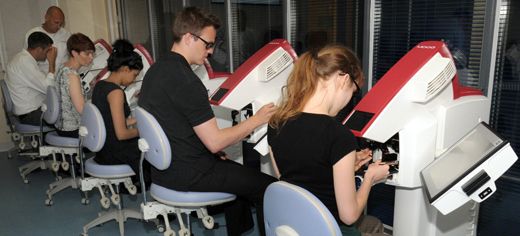
Dental students at the University of Leeds Dental Institute will be the first in the UK to cut their teeth on new simulation technology, allowing them to hone their drilling skills on virtual patients
The next generation of dentists, dental hygienists and dental therapists are being presented with virtual 3D mouths to explore, where they can practice using drills to remove tooth decay.
The technology should help students bridge the gap between learning the theory of dentistry and the moment they face a real patient for the first time.
The virtual mouth uses haptic technology, similar to that used in flight simulators for pilot training or used in hand-held controllers that vibrate in computer games.
When drilling into teeth, the virtual mouth gives students tactile feedback, so they can experience the difference between drilling into health enamel or decaying teeth. It is this sensation of resistance that helps students learn how much pressure to use when drilling.
The University of Leeds is the first institution in the UK to invest in enough virtual mouths so that every student on its courses can regularly experience the virtual world of dentistry.
Director of Student Education at the University of Leeds Dental Institute, Professor Paul Brunton, believes this will create a new ‘virtual’ standard of dentistry training, build confidence in dental students and go a long way to relieve any patient anxieties.
“Up until now, students have practiced using a ‘phantom head’, which is a mannequin with teeth. You need these to help you get to grips with what it’s like to have a real patient in front of you. But it’s still a big step to then drill into someone’s teeth for the first time. Dentistry is all about skill, dexterity and most importantly, practice. So having a virtual mouth to test and perfect your skills on, time and time again, means our students are going to be very well practiced before they treat a patient.”
The virtual environment also allows dental students to play back what they’ve done, examine their technique, analyse how successful they were and identify areas for improvement.
It also prepares students for a wider range of dental procedures, building up more complex cases than a phantom head can offer, such as tackling decay on a single tooth through to opening teeth for root canal treatment.
“The students who have trialled the virtual mouths have already appreciated the very realistic experience it offers, even down to working with a tongue that reacts to your touch. This technology presents a huge step forward in the way dentistry students will master their training.” Professor Brunton continued.
For more information
Contact Rachel Barson, Press Officer, University of Leeds, T: +44 113 343 2060 or E: r.barson@leeds.ac.uk